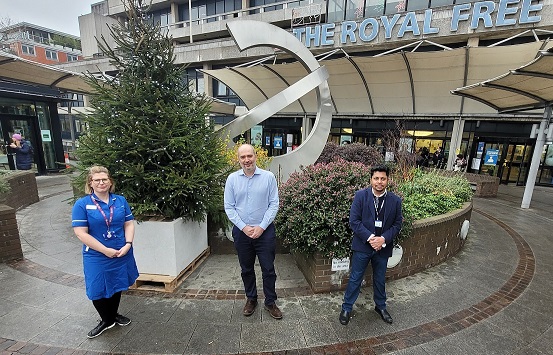 Patients at risk of developing a type of advanced liver disease are accessing vital care much sooner, thanks to the work of a consultant based at the Royal Free Hospital.
Patients at risk of developing a type of advanced liver disease are accessing vital care much sooner, thanks to the work of a consultant based at the Royal Free Hospital.
Although one in four adults has non-alcoholic fatty liver disease (NAFLD), only a small percentage of those are at risk of developing a life-threatening condition known as liver fibrosis. And without interventions such as a change in diet and medication, those patients also run significant risk of heart attack and stroke, in addition to liver failure.
Professor Manolis Tsochatzis says the problem is identifying the patients who need consultant care. “Historically, looking for people with advanced non-alcoholic fatty liver disease was like looking for a needle in a haystack,” he said. “It was very much down to individual GPs - some might send no-one through to us and others would over-refer.”
In order to tackle this problem, Professor Tsochatzis designed a new system for referring patients from GPs to hospitals, which is called the Camden and Islington NAFLD pathway.
Patients initially have a blood test analysed by a GP using an automated calculation, based on age, platelet count and liver enzymes, which rules out those who don’t have advanced liver fibrosis. The result also indicates whether patients can remain under the care of their GP for NAFLD – around 60% do so.
The remainder have a second more specific blood test which detects direct markers of liver fibrosis and from these results, around a fifth of those patients would be referred for a hospital appointment with a consultant overseeing their care.
The new model of care means patients are now almost five times more likely to be identified as being at risk of having advanced liver disease and as such they are more likely to access crucial care sooner.
These patients have complex needs and require a multidisciplinary team approach.
The liver team at the Royal Free Hospital offers a ‘one-stop shop’, allowing patients to access care from a liver dietitian (Mrs Roshni Patel), a consultant chemical pathologist (Dr Atul Goyale) who looks at the cardiovascular risk of patients, a specialist nurse (Mrs Jennifer Clancy) who co-ordinates care, as well as a consultant hepatologist (Professor Tsochatzis) all on the same day. Patients also receive a liver scan.
Thanks to this approach, half of patients are discharged after a single appointment, but with a plan of action to follow, which can be monitored by their GP.
In an audit of over 500 patients, 30–40% required treatment for other conditions such as type 2 diabetes, hypertension and cholesterol. Treating these conditions has resulted in an average gain of six ‘heart attack and stroke free’ years for those patients, on top of the management of their primary liver disease.
This approach not only improves outcomes for patients, but it can lead to significant savings for the NHS thanks to early detection and intervention and the avoidance of unnecessary referrals.
Although the only treatments currently available for NAFLD are losing weight and exercising more, eligible patients are being offered the opportunity to take part in clinical trials with the hope of improving outcomes for patients in the future.
The work of Professor Tsochatzis and his team in developing this new model of care has recently been recognised by the British Society of Gastroenterology, who awarded them runner up for the CSSC Service Development Prize 2021.
Professor Tsochatzis adds: “This has been an incredibly rewarding piece of work and the feedback we have from patients in the clinics is overwhelmingly positive. I’d like to say thank you to my incredible multidisciplinary team but also to the GPs, Sarah Morgan and Karen Senett, involved in the primary care pathway. The results clearly show the benefit of working in greater partnership across the healthcare system.”
Pictured L-R: Jennifer Clancy, Professor Tsochatzis and Dr Atul Goyale

 Translate
Translate